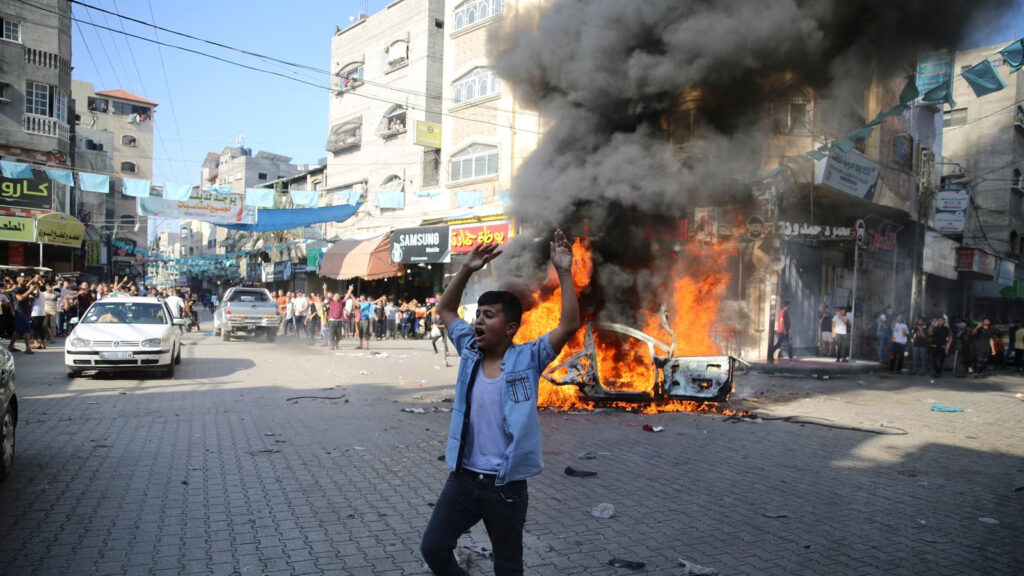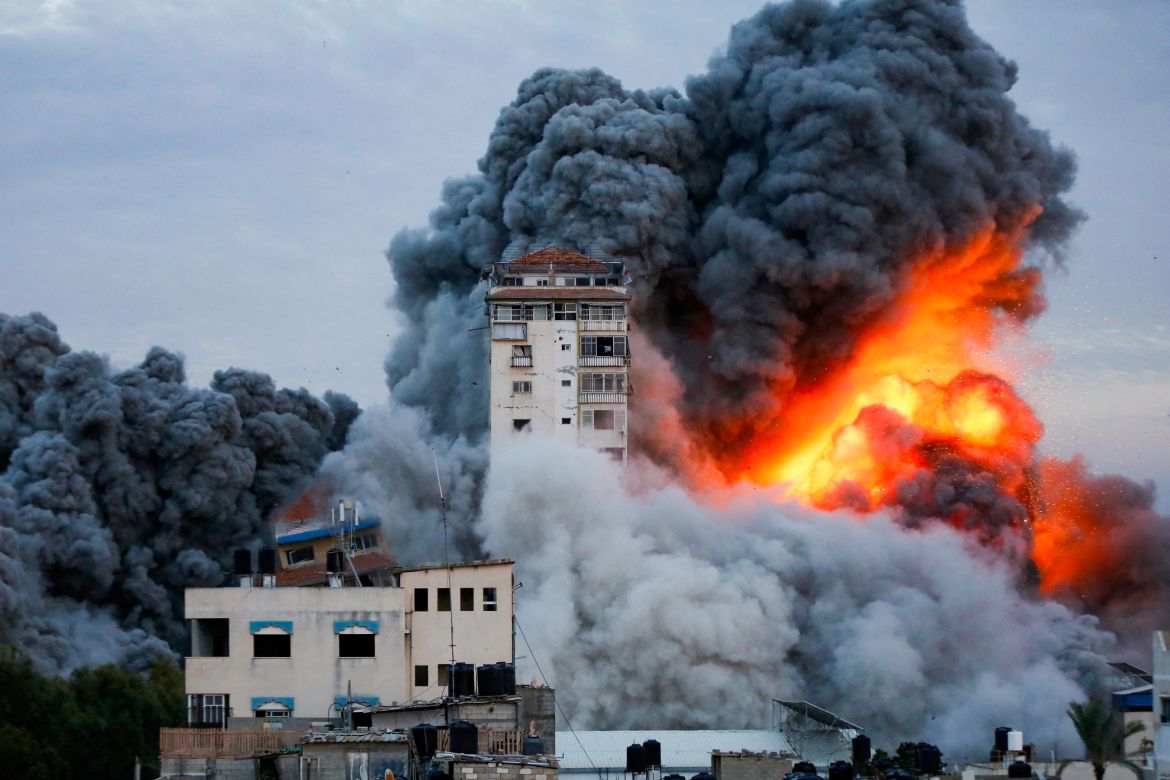Israel Gaza Conflict – A Comprehensive Guide
A shocking event took place on October 7th when the Palestinian group Hamas launched a surprise attack on Israel. Gunmen, numbering in the hundreds, managed to enter communities near the Gaza Strip, causing destruction and loss of life.
Tragically, more than 1,400 Israelis have lost their lives while the Israeli military has confirmed that 199 soldiers and civilians, including women and children, are currently being detained in Gaza. In retaliation, the Israeli military has carried out multiple airstrikes on Gaza, leading to the deaths of at least 2,700 Palestinians. The situation is worsened by a total blockade imposed by Israel, leading to a lack of vital resources for the people living there.
Adding to the concern, Israeli forces are gathering near the Gaza boundary, raising fears of a ground operation that could result in even more casualties.
In this article, we will provide a comprehensive understanding of the Israel Gaza conflict, shedding light on the details and consequences of this ongoing situation.
Understanding Israel before 1948 and the Balfour Declaration
After World War One, the Ottoman Empire lost control over the region known as Palestine, and Britain took charge. In Palestine, there were more Arab people than Jews, but both groups lived there. Other smaller ethnic communities also called this land their home.
The Balfour Declaration and Britain’s Responsibility
In 1917, the international community requested that Britain assist in the establishment of a “national home” in Palestine for Jewish people. This request was in response to the Balfour Declaration, a promise made by Britain’s Foreign Secretary, Arthur Balfour, to the Jewish community. The declaration was subsequently included in the British mandate over Palestine and received support from the League of Nations, which later became the United Nations, in 1922.
Conflicting Views and Growing Violence
Jews considered Palestine as their ancestral homeland, and they wanted to live there. But Palestinian Arabs also believed that the land belonged to them, and they strongly opposed the idea of a Jewish state. The number of Jewish immigrants to Palestine increased between the 1920s and 1940s, as many escaped persecution, especially during World War Two’s Nazi Holocaust. As tensions grew, violent clashes between Jews, Arabs, and the British also became more frequent.
The UN Decision and Its Consequences
In 1947, the United Nations passed a resolution to partition Palestine into distinct Jewish and Arab states, with Jerusalem designated as an international city. While Jewish leaders agreed to this proposal, it was rejected by the Arab side and ultimately not implemented. This decision set the stage for Israel Gaza conflict in the region’s history.
The Creation of Israel and its Aftermath
In 1948, Britain couldn’t find a solution to the problem and decided to leave. As a result, Jewish leaders officially announced the establishment of the State of Israel with the aim of offering a secure refuge for Jews who were being persecuted.
It was also intended to serve as a national homeland for Jewish people. Tensions between Jewish and Arab factions had been escalating for several months.
Within 24 hours of declaring its independence, Israel was attacked by five Arab nations. This caused hundreds of thousands of Palestinians to leave or be forced out of their homes. They call this event Al Nakba, which means the “Catastrophe.“
By the end of the war and a ceasefire the following year, Israel had taken control of most of the land. Jordanian forces occupied the territory commonly referred to as the West Bank, while Egyptian forces assumed control of Gaza. The city of Jerusalem was split, with Israeli forces stationed in the western portion and Jordanian forces in the eastern portion.
Because no peace agreement was ever reached, more wars and fighting took place in the following decades. The lack of resolution contributed to ongoing conflicts and difficulties in the region.
The Israel Gaza Conflict: Land and Citizenship Disputes
In 1967, Israel gained control over East Jerusalem, the West Bank, the Syrian Golan Heights, Gaza, and the Egyptian Sinai peninsula during a war. Today, a majority of Palestinian refugees and their descendants live in Gaza, the West Bank, and neighboring countries such as Jordan, Syria, and Lebanon.
However, Israel has prohibited them from returning to their original homes. Israel claims that allowing their return would overwhelm the country and endanger its status as a Jewish state.
Currently, Israel occupies the West Bank and insists that the entire city of Jerusalem belongs to them as their capital, opposing the Palestinian claim that East Jerusalem should be the capital of their future state.
Remarkably, only a handful of countries, including the US, acknowledge Jerusalem as the capital of Israel. Over time, Israel has built settlements in the West Bank and East Jerusalem, now housing over 700,000 Jewish residents.
These settlements are widely deemed illegal according to international law, a standpoint supported by the UN Security Council, UK government, and other nations. However, Israel disputes this perspective.
The Gaza Strip: An Overview
The Gaza Strip is a thin piece of land wedged between Israel and the Mediterranean Sea. It also has a brief border shared with Egypt, located in the southern part.
With a length of 41km (25 miles) and a width of 10km, this area is inhabited by more than two million people, making it one of the most densely populated areas on Earth.
Following the 1948-49 war, Egypt held control over Gaza for 19 years. However, in the 1967 war, Israel took over Gaza and remained in control until 2005. During this period, Israeli authorities constructed Jewish settlements within the territory.
In 2005, Israel fully removed its military personnel and settlers from Gaza, while retaining control over its airspace, shared border, and coastline. Despite Israel’s withdrawal, the United Nations still regards the Gaza Strip as being under Israeli occupation.
Key Challenges in Israeli-Palestinian Relations
There are numerous contentious issues that provoke disagreement between Israelis and Palestinians. These include:
- The Fate of Palestinian Refugees
- Status of Jewish settlements in the occupied West Bank
- Division of Jerusalem between the two sides
- The establishment of a Palestinian state alongside Israel.
Negotiations for peace between Israel and Palestine took place sporadically from the 1990s to the 2010s, often interspersed with episodes of violence.
In the early stages, the prospects for a negotiated peace seemed promising. The Oslo peace process, developed through confidential discussions in Norway, acquired symbolic importance with a ceremony on the White House lawn in 1993, under the guidance of President Bill Clinton.
This pivotal event saw Palestinians officially recognizing the State of Israel, while Israel acknowledged the Palestine Liberation Organisation (PLO) as the sole representative of Palestinian people.
As a result, a self-governing Palestinian Authority was formed. However, divisions began to surface soon after.Opposition leader Benjamin Netanyahu, at the time, deemed the Oslo accord a severe threat to Israel.
In recent years, Israel has been actively working to establish Jewish settlements in the occupied Palestinian territories. This has been met with resistance from the militant group Hamas, who have carried out suicide bombings in Israel.
These attacks have hindered the possibility of reaching a comprehensive agreement. Tensions within Israel also escalated, leading to the tragic assassination of Prime Minister Yitzhak Rabin by a Jewish extremist on November 4, 1995.
Efforts to revive the peace process were made in the 2000s, including a roadmap for peace created by world powers in 2003 with the aim of achieving a two-state solution.
However, this plan was never implemented. In 2014, talks between Israelis and Palestinians failed in Washington, dealing another blow to peace efforts. Most recently, during Donald Trump’s presidency, the United States proposed a peace plan known as “the deal of the century.”
While Prime Minister Netanyahu hailed it, the Palestinians dismissed it as one-sided, resulting in the plan remaining inactive.
Why are Israel and Gaza Currently at War?

The Gaza Strip is under the control of a group known as Hamas, which holds strong animosity towards Israel and seeks to dismantle it. Numerous nations, such as the UK, categorize Hamas as a terrorist organization.
Hamas won an election in 2006 and took over Gaza the next year by kicking out their rivals, a group called Fatah, who were led by President Mahmoud Abbas and operated in the West Bank.
Since then, there have been several wars between militants in Gaza and Israel. To try and prevent attacks, Israel and Egypt have put a partial blockade on Gaza. This means they limit what goes in and out of Gaza, which can make life difficult for the people there.
People in Gaza complain that Israel’s restrictions and bombings in crowded areas are like punishing everyone together. They feel limited in their movement, have limited access to things they need, and it takes a toll on their mental health because they live in a place where there’s always conflict.
This year has been really deadly for Palestinians living in the West Bank and East Jerusalem, areas that are occupied by Israel. They also feel the restrictions and military actions happening there are a response to attacks on Israelis. These tensions might have led to Hamas launching their latest attack.
Hamas might also be trying to gain more support from ordinary Palestinians by using hostages to pressure Israel into releasing the thousands of Palestinians held in Israeli prisons.
Latest Updates on Israel Gaza Conflict
India Calls for Strict Observance and Respect
As of October 19, 2023, India has actively urged for strict adherence to humanitarian law and the respect of human rights in the ongoing Israel Gaza conflict. Expressing deep concern over the loss of civilian lives and the damaging impact on essential infrastructure, India emphasizes the urgent need for a resolution that prioritizes these fundamental principles1.
Israeli Denial of Targeting Hospital in Gaza
Israel has vehemently denied any intentional targeting of a hospital in Gaza, which tragically suffered an explosion leading to the deaths of at least 471 individuals on Tuesday night. Israel places the blame on a misfired rocket launched by the Palestinian Islamic Jihad group, while the group strongly disputes this accusation.
Magnitude of Bombings and Unprecedented Comparison
Amidst the Israel-Gaza conflict, Israel claims to have dropped a staggering 6,000 bombs on Gaza since October 7. Remarkably, this number nearly matches the total number of bombs used by the United States over the span of a year in Afghanistan. It is worth noting that the size of Afghanistan is approximately 1,800 times larger than that of Gaza.
US Travel Advisory for Lebanon
The State Department of the United States has released a travel advisory warning Americans against traveling to Lebanon due to the unpredictable security conditions. This caution is influenced by factors such as kidnappings, unrest stemming from the Israel-Hamas war, and the intensified “rocket, missile, and artillery exchanges” between Israel and Hezbollah.
President Biden’s Proposed Funding Request
In a bid to address various pressing concerns, President Joe Biden is preparing to submit a request for supplemental funding totaling $100 billion to Congress. This proposed allocation would encompass financial support for Israel, Taiwan, Ukraine, and bolstering US border security measures.
Warning of Impending Crisis in Overcrowded Shelters
Action Against Hunger has raised the alarm regarding the precarious situation in overcrowded displacement shelters in Gaza. These shelters are on the brink of reaching their maximum capacity, with concerns mounting over a potential health crisis triggered by a scarcity of water.
Bottom Line
The Israel Gaza conflict is a complex and ongoing issue that has caused much suffering and violence. In this article, we have explained the historical and political background of the conflict, as well as the current situation and its consequences. We hope that this article has helped you gain a better understanding of the Israel Gaza conflict and its implications for the region and the world.












[…] Learn about the history, causes, and effects of the Israel Gaza conflict. Find out the details and consequences of this ongoing situation. […]
October 31, 2023 at 11:27 am